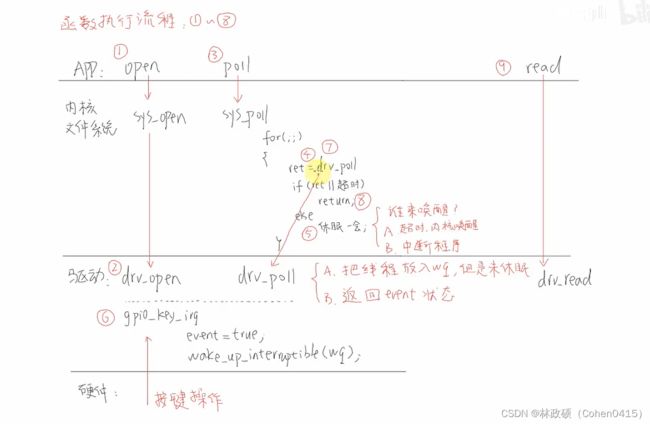POLL机制
文章目录
- 一、POLL机制
-
- 1、应用场景
- 2、执行流程
- 二、程序
-
- 1、驱动程序
- 2、测试应用程序
- 三、总结
一、POLL机制
1、应用场景
使用休眠-唤醒的方式等待某个事件发生时,有一个缺点:等待的时间可能很久。我们可以加上一个超时时间,这时就可以使用POLL机制。
简单理解就是: 我在等待一个外设信号,但 POLL机制 比 休眠-唤醒的死等 多了一个功能就是我可以设置超时时间,假如超时后,我的应用程序又应该去执行什么。相比之下,在应用程序中会多了一些灵活性。
2、执行流程

首先,我们熟悉当应用程序执行open()函数时,内核会调用驱动里对应的drv_open()函数。poll()函数也差不多,当应用程序执行poll()函数,内核最终会调用到驱动里对应的drv_poll()函数。
但是,应用程序中的poll() 和 驱动程序的drv_poll()中间的sys_poll()还会做些事情。
如上图,我们从第三步开始分析(基于读取按键值的情景):
①、…
②、…
③、应用程序poll()执行后,进入到sys_poll(),里面的程序是内核开发者完成的;
④、sys_poll()里有个for循环,此时会调用驱动层里我们写的drv_poll(),drv_poll()只做两件事:
第一、drv_poll()要把自己这个线程挂入等待队列 wq 中,但未休眠;
第二、返回状态;
⑤、此时drv_poll()返回没有数据,则sys_poll()进入到else分支开始休眠;若休眠时间超过指定时间,则回到for循环开头再次调用drv_poll(),drv_poll()依旧返回没数据,但目前已经超时,sys_poll()开始返回到应用层,应用层收到的结果是超时;
⑥、假如在休眠时,按键按下且数据被记录,按键中断程序会唤醒线程;
⑦、此时sys_poll()重新回到for循环开头再次调用drv_poll(),drv_poll()知道有按键按下了,则返回有数据;⑧、sys_poll()随后经过if判断后返回到应用层,应用层收到的结果是有数据;
最后,应用程序中收到poll()返回的有数据,才会进一步调用read()函数读取按键值。
二、程序
1、驱动程序
#include 2、测试应用程序
#include \n" , argv[0]);
return -1;
}
/* 2. 打开文件 */
fd = open(argv[1], O_RDWR);
if (fd == -1)
{
printf("can not open file %s\n", argv[1]);
return -1;
}
fds[0].fd = fd;
fds[0].events = POLLIN;
while (1)
{
/* 3. 读文件 */
ret = poll(fds, 1, timeout_ms);
if ((ret == 1) && (fds[0].revents & POLLIN))
{
read(fd, &val, 4);
printf("get button : 0x%x\n", val);
}
else
{
printf("timeout\n");
}
}
close(fd);
return 0;
}
三、总结
1、以上专业术语或名词解释有个人理解,感谢指点纠错!
2、视频学习B站韦东山:【第5篇】嵌入式Linux驱动开发基础知识 - POLL机制